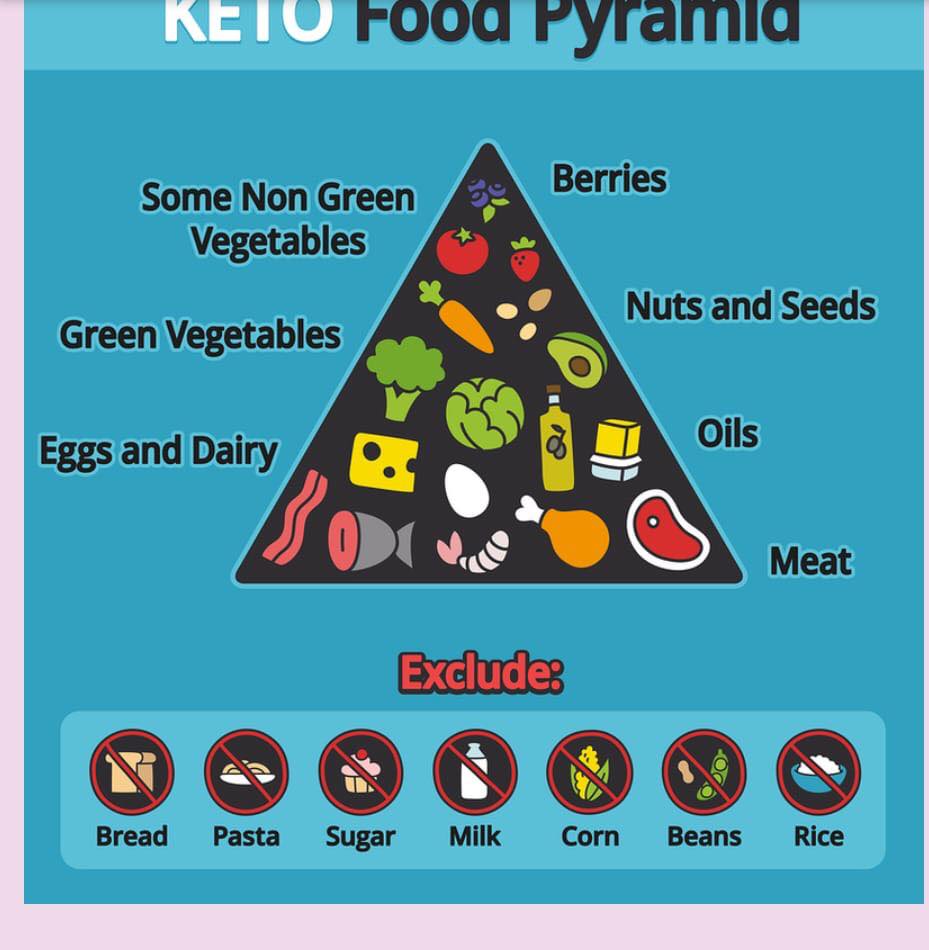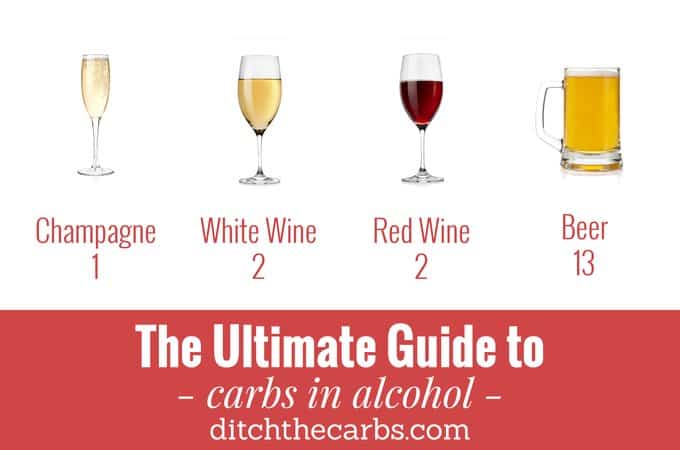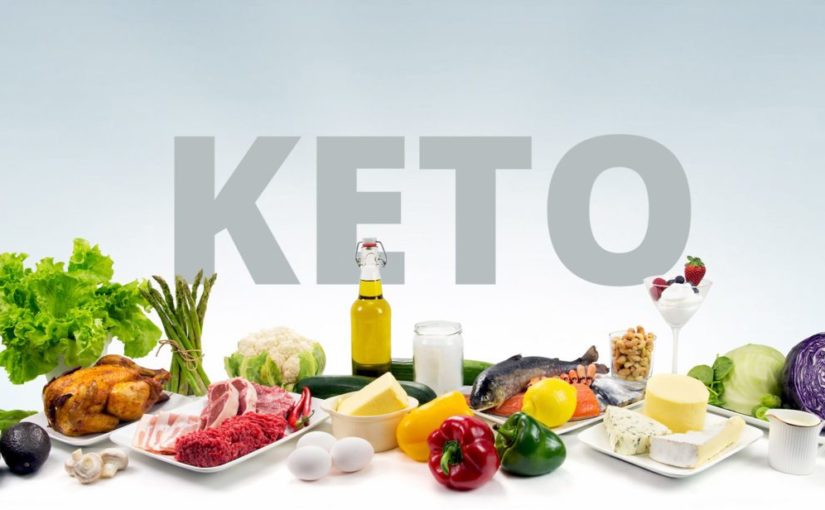“Keto” is short for “ketogenic”. The ketogenic diet flips conventional nutritional wisdom on its head and advocates reducing carbohydrate intake to less than 20g carbs per day and promotes consumption of higher than normal levels of GOOD fats and moderate amounts of protein! When you reduce carbs so drastically, your body is forced to burn fat for fuel, instead of the conventional glucose or carbohydrate metabolic pathway. The by-products of burning fats for energy are called “ketones”. Fun fact: the ketogenic diet was first developed in the 1920’s for people living with epilepsy. The keto diet is similar to low-carb diets like Atkins which became popular in the 1980’s. Low-carb diets typically allow for consumption of more than 20g carbs per day, even up to 100g carbs. I’ve been doing the keto diet for over a year now and I couldn’t be happier! I’ve compiled answers to the questions I’m most frequently asked.
What are carbs?
Carbs are the enemy. Not sure what carbs are? They are your typical starches like bread, rice, flour, pasta, crackers, cookies, cake, sugars, yams, potatoes and fruits. Yes, fruit. I’ll get back to fruit in a separate section later on. What does 20g carbs look like? Well a slice of bread typically has 15g carbs. 1 cup cooked rice has 28g carbs. 100g of broccoli on the other hand has 1.5g carbs. Check this out to see the carb count in some of your favourite foods.
So why are carbs bad?
Contrary to what we’ve been taught, weight loss isn’t simply calories in versus calories out. Our bodies are way more complex than that and weight loss and gain are a function of hormones and body chemistry. You’ve all gone the calorie restriction route haven’t you, yet you’re here. Caloric restriction is painful and unsustainable and sometimes it doesn’t even work! When some of us eat carbs, our bodies secrete a hormone called insulin. This hormone quickly instructs our bodies to shut down fat-burning. When our insulin levels are high, the result is inflammation all over our bodies and so you know what happens when there is inflammation in our bodies? Well inflammation is linked to heart disease, cancer, diabetes, dementia and some auto immune diseases like lupus. Inflammation is not a good thing. Another thing about insulin is that it interferes with our feeling of fullness. That’s why when you snack on high carb stuff like chips or crackers it is literally impossible to stop until you finish the entire bag! And you still feel hungry afterwards!
But some people eat carbs and don’t get fat. How come?
We’re all different in how sensitive we are to insulin. There are those lucky ones among us who can eat all sorts of carby stuff and stay lean. Those of us who are what is termed “insulin-resistant” will over-secrete insulin the moment any carbohydrate hits our blood stream and this will negatively impact our body’s ability to burn food efficiently and will increase our cravings. You’ve got to know what works for you. A low-carb diet is the only way I’ve been able to lose weight over the years.
Is the keto diet sustainable? Isn’t it just another diet fad?
To be clear, keto has now become a buzz-word and is the latest fad making the rounds for the millions of us interested in losing weight. So what. Does it work for you? When you buck traditional teachings on nutrition and remove carbs and up fat, does it work for you? It works for me. I’ve lost weight and gained energy, clarity of thought and increased overall wellness. I haven’t had the flu in the year I’ve been eating this way. My heartburn has disappeared. My acne has disappeared. My asthma has disappeared. I sleep better. Sustainability or not boils down to choice. I can either continue to eat this way or not. It is all up to me.
So what can we eat on the keto diet?

The surprising things we avoid on the keto diet are fruit and beans!
Why can’t we eat fruit on the keto diet? And beans?
Remember what we’re trying to achieve: we want to stop our bodies from secreting insulin because when our bodies are flooded with insulin we get inflammation, we never feel full, and we don’t burn fat. What triggers insulin? Carbohydrates trigger insulin. Fruit is full of sugar. Beans are starchy. They’re not as starchy as rice for example, but they are more starchy than green veggies like lettuce or spinach or broccoli and when the body detects these carbs, boom! Out rushes the insulin and then we wonder why we aren’t losing weight even though we are eating supposedly healthy foods like fruit and yogurt and non-fat milk. Challenge your learning and listen to your own body.
But not all carbohydrates are created equal are they. Aren’t processed carbs the real enemy on the keto diet?
Sure. Sugar in sodas and white rice and bleached flour in bread are horrid poisons that I don’t think I’ll ever ingest again. Whole foods like sweet potatoes and whole grains and beans ought to be better. Sure they’re better. But they’re still carbs. I avoid them. There are some who allow themselves a little of these “complex carbohydrates” in version of the keto diet called “lazy keto.” That’s fine. I’ll repeat: know your own body. Be clear as to your goals and don’t sabotage yourself. It always boils down to personal choice. Now that I’ve lost some weight, I allow myself some beans for example. So I make a bean soup with less beans than I’d typically use and bump up the veggies in the soup as compensation. Or I make a bean salad with less beans than I’d typically use and bump up the cucumbers and parsley as compensation. And I keep my portions of these higher carb foods small. Or at least I try to (if I’m keeping it real). Get the picture? Google carb counts for yourself and make your decisions. I’ve seen people insist that because sweet potato for example has a low glycemic index (that means that it causes blood sugar levels to be raised really slowly, therefore reducing insulin secretion, compared to something like white potatoes which has a high glycemic index so your body floods itself with insulin when you eat those) they can merrily consume large quantities. It’s still a carb that will trigger insulin secretion. If weight loss is your goal and you feel that you simply have to have sweet potatoes, portion control has to be part of your plan.
Why are we eating fat to lose fat on the keto diet?
Essentially, we want to get our bodies burning fat for energy. When we consume fats as we do on the keto diet, our bodies start burning those fats and our own fat stores at a rate higher than would be possible under a regime where we simply reduced calories. It’s as if you’re turning up a fat burning fire in your own body. Not all fats are created equal though. The fats you want to consume on the keto diet are full fats found in cream, eggs, butter, avocado, nuts, seeds, coconut oil, coconut milk, olive oil and meat. You’ll want to avoid processed fats like refined vegetable oils and margarine. Those are poison. The refining process alters the chemical structure of those fats and they will not fuel fat burning at all. The other benefit to consuming fat on this diet is that fats give a feeling of satiety. In other words, you feel full quicker and you feel full for longer. Low-fat foods have been offered as the solution to obesity over the years and yet we are bigger than ever! So called low-fat foods often have sugars added to bump up the taste that is lost when you take the fat out. We know what happens when our body detects sugars (remember that sugar is a carb). No wonder those low-fat foods don’t work. Stick with whole, natural fats and see what happens.
Won’t my cholesterol go up on the keto diet?
First of all, 75% of the cholesterol found in your body is produced by your own body. The remaining 25% comes from the foods you eat. How much cholesterol your body produces on its own depends on factors like genetics in many cases. Your cholesterol readings comprises 2 numbers: your HDL-C (good cholesterol) and LDL-C (bad cholesterol). Good cholesterol is important to good heart health. Imagine that.
There are studies that show that low-carb, high-fat diet optimizes cholesterol levels for two main reasons:
- Replacing carbs with the fats that are commonly consumed on the ketogenic diet improve total-to-HDL cholesterol ratio.
- Eating more unsaturated fats and lauric acid help to improve cholesterol levels even further.
In other words, when you restrict carbohydrates and get a majority of your calories from animal fats, coconut oil, and unsaturated fats like fish, nuts, avocado, and olive oil, it is highly likely that you will improve your cholesterol levels. Hello, Keto Diet!
Now I wish I could tell you of my own experience where my cholesterol is concerned since starting the keto way of eating. But I can’t. My cholesterol has always been in the normal range and I haven’t tested it since starting keto. However, I’ve seen testimonials from many people who have reported being taken off their cholesterol meds since going keto. Yes, some report a spike in the first few months of keto, but they report eventual lowering and stabilising in the ensuing months. Be guided by your family history and your own physician and your own body.
How much fat and how much protein on the keto diet?
Grasping the concept of macros is important for the keto diet because you need to find the right balance of carbs, protein, and fats to get into ketosis, stay in ketosis, and turn your body into a fat burning machine. Generally, the macronutrient ratio varies within the following ranges: 60-75% of calories from fat (or even more), 15-30% of calories from protein, and 5-10% of your calories from carbs. Your specific numbers will depend on your age, current weight, height, gender, activity level, weight loss goals and body fat percentage. Here’s a macro calculator that you can use if you want to go this route. I have never done this. Perhaps I should… it may speed up my weight loss. I simply keep my carbs as low as I can by eating only goods fats, protein and lots of green veggies. I struggle with portion control and know that I sometimes eat more protein than I ought. So maybe knowing my macros and sticking to them would keep me on target. But I don’t want to feel deprived in anyway and I hate feeling hungry. So for now, and so far, I simply keep my total carbs low.
Is the keto diet expensive?
My grocery bill has actually gone down over time. I buy green veggies that are in season. I consume a lot of eggs which is relatively cheap protein. Canned tuna is one of my best friends. And not having to buy staples and snacks has really reduced my overall spend. Shop sales and seasonal produce to get the most bang for your buck. And remember that I haven’t been ill in a year. Zero doctor or medical bills. I drink water. And my alcohol consumption is way down. Not buying rum, wine or sodas has cut my bill down too. I’m no longer buying ice cream or desserts either.
Can I drink alcohol on the keto diet?
Remember that on the keto diet, carbs and not calories are the enemy. The carb count in various alcoholic drinks may surprise you! Rum, not shown here, is 0 carbs, as are vodka and scotch. BUT NOTE! Even though my personal fave, rum, for example is zero carb, I rarely drink anymore. You see, alcohol kicks your body out of ketosis, which means while alcohol is in your blood stream, you’re not burning your fat stores any more. I’m not where I can afford to cease fat burning yet. So after 6 months of keto, I finally allowed myself the occasional drink. avoid beer and don’t use sugary chasers. I chase with water or a diet soda.

What’s the best way to start the keto diet?
That all depends on you. YOU need to to make those choices that will give you the best chance to succeed. I went cold turkey. I immediately cut all carbs out of my diet in one fell swoop. I made the decision, got rid of carbs from my house, advised my family that this was going down (I kept bread and rice for those who wanted it, told them they would have to get their own desserts and sugary drinks!), shopped for all the keto foods, wrote down a meal plan for the week and started. I know others who phased out carbs. And it worked for them.
What can I expect when I go keto?
You’ll likely feel weak, irritable, nauseous and tired in the first four days. It’s a thing. They call it the keto flu. Some people report mood swings and dizziness too. Ride it out, is my advice. It is temporary and it is your body detoxing itself and switching to fat burning mode. Drink loads of water, unsweetened herbal teas, avoid strenuous exercise, get enough sleep, bump up your salt intake. The keto flu may last even more than a week. Ride it out. One morning you’ll wake up more clear headed than you’ve ever been. Your energy levels will be through the roof. Keep going. In 14 days your clothes will be looser. In 21 days your skin will be clearer. At the end of a month high five yourself and celebrate the 10 lbs you probably just lost. Sure, some of that is water loss. It needed to go anyway. Your stomach will be flatter and eyes less puffy with all that bloat gone.
I hate to cook. How can I stay on the keto diet?
Truth be told, it is a lot easier to remain compliant on keto if you prepare your own food. There is hidden sugar everywhere! People add sugar to their pots, in salad dressings, in ketchup and other sauces. If you don’t like to cook or don’t have the time, there are some hacks that you can use. Supermarket bought rotisserie chicken is versatile and perfectly keto. Add it to salads, combine with steamed veggies or eat on its own. The deli section of most supermarkets offer great salad choices. Read your food labels carefully, especially the carbohydrate line. Remember a total of 20g or carbs per day is your goal. Canned tuna and canned chicken are convenient go-tos as well. In Jamaica, avoid the cook shops at lunch time. Find a jerk stand instead. In Jamaica too, there are many small businesses that provide cooked lunches to offices. You can ask them to omit the carbs and bump up the veggies. Some will charge you a little more, some won’t.
If you do cook though, but you don’t like to, simply cook more of whatever you’re cooking whenever you’re cooking it. Freeze the excess. Invest in a couple freezer ready lunch containers and use them up. Even cooked veggies freeze up nicely. That way you only cook once or twice for the week and you still have the benefit of great keto food to keep you on track.
If you eat out a lot, simply make informed food choices if you want to remain keto. Salads with ranch or vinaigrette dressings on the side, grilled meats of all kinds, steamed or grilled veggies with butter on the side and cheeses are all your friends. Don’t go for smothered or heavily sauced options. These sauces tend to be high in flour and sugar and will derail your best efforts. Ask questions about how the food was prepared. It’s your body and your health.
**************************************************
So are you feeling a little more comfortable about the keto diet? Shoot me any additional questions you have or post them in the comments at the end of this post.
Please subscribe to my blog and get a free copy of 8 easy keto recipies that I have found invaluable for transitioning to a keto way of life.
Disclaimer:
I am not a certified nutritionist and make no claims to the contrary. Each individual’s dietary needs and restrictions are unique to the individual. You are ultimately responsible for all decisions pertaining to your health. The information on this website is written and produced for informational purposes only. This website is not intended to diagnose, treat, cure or prevent any disease. Content should not be considered a substitute for professional medical expertise or treatment. The reader assumes full responsibility for consulting a qualified health professional regarding health conditions or concerns, and before starting a new diet or health program.


Great information – thanks for sharing and explaining how the carbs work!
I have been wondering about this diet. My body is very vulnerable to carbs and sweets. I love this article because it was so informational. I will share with my private fb community as well.
Thank you so much for sharing.
This is an interesting article, I’ve actually never heard of this diet before.
Best analysis of the keto diet that I’ve read. Was able to actually read all of it. Makes it seem more doable for me now. Thanks for the info.
Thank you so much for this feedback, Marcia! I appreciate it. Please feel free to share 🙂 Thanks again and good luck on your own journey.
Thanks for having this article and answering all these common questions about the keto diet!